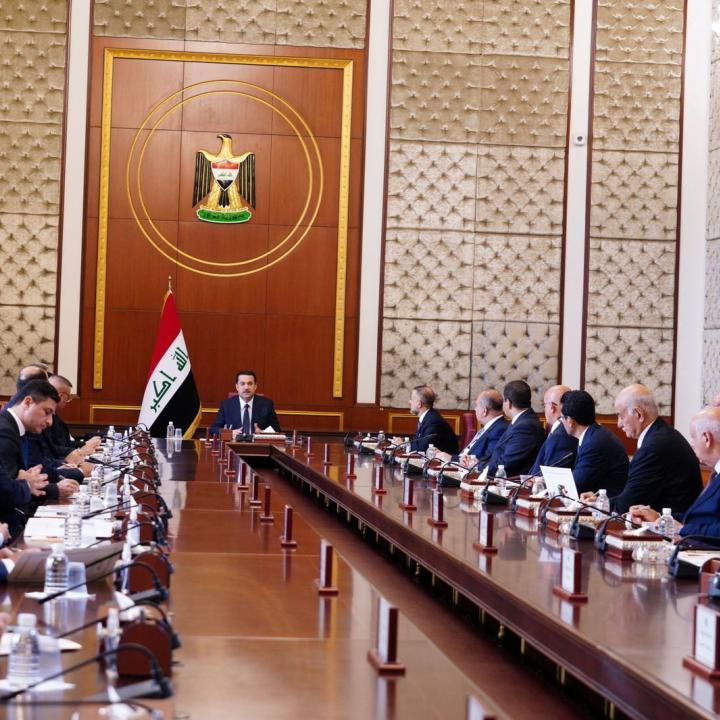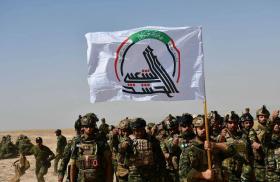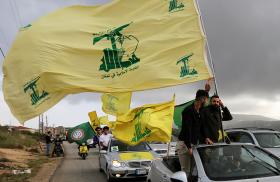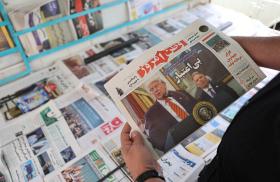
- Policy Analysis
- PolicyWatch 3925
Iraq’s Watergate and the Fallout for U.S. Relations

The politicized corruption of the country’s best intelligence agency has exploded into a major eavesdropping scandal directed from the prime minister’s office, and Washington should adjust bilateral intelligence sharing accordingly.
On August 28, news began to emerge from investigative reporting about a widespread political surveillance campaign involving the office of Iraqi prime minister Mohammed Shia al-Sudani. The scale of the effort was so extensive that even Iraqi politicians and citizens—who are thoroughly used to corruption and scandal by now—were shocked by the case. For the United States, the scandal is yet another glaring indicator that Iraq is not as stable as it is sometimes presented to be, nor is its current government the reliable security and intelligence partner Washington needs.
Who Wiretapped Who?
The original reporting on the scandal has quickly been piled onto by other major Arab news outlets and Iraq’s notoriously leaky officials and political class. The seismic reverberations in Baghdad—including numerous emergency meetings by political factions—suggest that there is a lot of fire behind the visible smoke. The following points seem clear so far:
Almost all of Iraq’s senior political figures were targeted for hacking or surveillance on their communication devices, including:
- Supreme Judicial Council head Judge Faeq Zaidan
- Former prime minister Nouri al-Maliki and his son-in-law and commercial fixer, Yasser Abdul Sukhail al-Maliki
- Hadi al-Ameri, the head of two major Iran-backed political entities: the Coordination Framework and the Badr Organization
- Acting speaker of parliament and Badr affiliate Muhsin al-Mandalawi
- Former speaker of parliament Mohammed al-Halbousi (one of many Sunni Arab politicians targeted)
- Former prime minister Haider al-Abadi
- Humam Hamoudi, head of the Islamic Supreme Council of Iraq (ISCI)
- Ahmed Fatlawy, advisor to Hikma party chief Ammar al-Hakim (among numerous other political party figures targeted)
- Various figures in the president’s office
- Various officials in the Popular Mobilization Forces (PMF)
Noticeably absent from the list so far are Sudani’s closest supporter, Qais al-Khazali, and senior members of his militia Asaib Ahl al-Haq (AAH). Both Khazali and his militia have been designated by the United States as terrorist entities.
The eavesdropping cell was based in the prime minister’s office and operated by a range of figures close to Sudani:
- Abdul Karim al-Sudani, the prime minister’s military secretary and a tribal relative
- Khalid al-Yaqoubi, Sudani’s security advisor
- Mohammed Johi, the cell leader and deputy director-general for administrative affairs in the prime minister’s office (Johi has confessed to the crime, and his electronic devices have been analyzed)
- Ahmed al-Sudani, another relative of the prime minister and acting head of the Iraqi National Intelligence Service (INIS)
- Eleven signals intelligence technicians from the INIS Technical Directorate’s Department of Eavesdropping
- Various officers at the National Security Service (NSS) and the Interior Ministry’s Federal Information and Investigations Agency (FIIA)
Johi and others involved in the eavesdropping used INIS property, equipment, and vehicles to carry out the scheme, authorized by Ahmed al-Sudani. In addition, NSS personnel were seconded to Johi’s cell by the agency’s chief, Abu Ali al-Basri (aka Abdul Karim Abed Fadel Hussein al-Jabari), an effective pursuer of Sunni terrorists but also the Coordination Framework’s top witch-hunter against political adversaries.
On September 3, the prime minister’s personal photographer was arrested in relation to the scheme.
The eavesdropping cell attempted to entrap and develop compromising materials on various political figures, including members of parliament, judicial officials, intelligence officers, and female family members of important persons.
The Ruin of INIS
The surveillance scandal—which will likely bubble all the way through to the next government formation period after the October 2025 election—should come as no surprise given past warnings about the ruinous politicization of Iraq’s best intelligence agency, INIS, since early 2023, when Sudani placed his relative, Ahmed, in acting control of the organization. The CIA first built INIS from salvaged parts of Iraq’s pre-2003 intelligence agencies, then vetted and trained its personnel for twenty years. While the country’s numerous other intelligence agencies became deeply penetrated by Iran-backed militants, INIS remained a bastion of relative trustworthiness for the United States and other Western governments. This is why it was among the very few Iraqi entities entrusted with sensitive U.S. signals intelligence, equipment, and training. Yet all of this changed when Sudani became prime minister.
Since 2022, Sudani’s government has purged many key U.S.-trusted INIS officers and replaced them with agents from Iran-backed militias. The new INIS counterintelligence director appointed in early 2023—whose job is to prevent penetration of the agency—is Faisal Ghazi al-Lami, a nephew of PMF chairman Faleh al-Fayyad and a long-term protege of Abu Ala al-Walai. Fayyad and Walai have been designated by the U.S. government for human rights abuses and terrorist activities, respectively. Moreover, the INIS director of surveillance is Wissam al-Mihyawi, another Fayyad nominee.
The NSS—which was previously on the mend after years of terrorist infiltration—has also backslid since 2023, when Basri was given the keys to the agency. Top posts such as deputy director, director of operations, and head of Baghdad security operations were given to AAH officials. The current scandal only reinforces the degree to which Iraq’s most important and technically proficient intelligence agencies are sinking into the mire of Iran-backed militias and corrupt politicians.
U.S. Policy Options
The surveillance scandal should be an eye-opening moment for Western policymakers, on several counts. First, Washington should not try to paper over the damage that has been done to Sudani’s premiership. For years, U.S. officials have avoided acknowledging Sudani’s very close ties to AAH, a designated terrorist organization. The leader of such a group—Qais al-Khazali, himself a designated terrorist—should not be permitted to puppeteer Iraq’s government and, by extension, its relations with the United States. If new evidence emerges indicating that Sudani had direct knowledge of the eavesdropping campaign, Washington may need to adjust its attitude toward the prime minister more generally, in part because malign actors could easily use such evidence to gain power over him. The United States should not be more committed to Sudani’s political survival than his own sponsor, Khazali, who seems angered that such a scandal has emerged out of operational security errors made by a cell in the prime minister’s office. On August 31, Iran deployed a delegation to Baghdad in an attempt to shush the scandal, underlining the need for Washington to do just the opposite.
Second, the United States should greatly restrict intelligence cooperation with INIS, NSS, and other agencies until they remove malign political appointees from their senior ranks, especially pro-militia and pro-Iran figures. After Sudani became prime minister, Washington turned a blind eye to his government’s disturbing appointments in the intelligence sector. Various factions will surely try to use the current scandal to inject a new crop of bad actors into senior intelligence roles. The United States must use its leverage as Iraq’s key counterterrorism partner to ensure that the government does not merely swap “bad” for “equally bad or worse” when cleaning up the scandal and appointing new officials to INIS, NSS, and FIIA.
Third, Washington should broadly review its attitude toward Iraqi officials in sectors as diverse as the Counter Terrorism Service, airport authorities, port authorities, and key ministries (e.g., Finance, Interior, Oil, Transport, and even Higher Education, whose minister is a member of a U.S.-designated terrorist group yet moves freely around Western capitals). These and other agencies have been deeply penetrated in the same manner as INIS—a trend that began before 2022 but has greatly accelerated since then due to the Coordination Framework’s domination of Iraq’s executive, judicial, and legislative branches. The main lesson for U.S. officials is that the character and political will of Iraqi prime ministers is the most important factor in deciding the extent of this Iran-backed state capture, and thus the severity of potential damage to U.S.-Iraq relations.
Michael Knights is the Bernstein Senior Fellow at The Washington Institute and cofounder of its Militia Spotlight platform.




